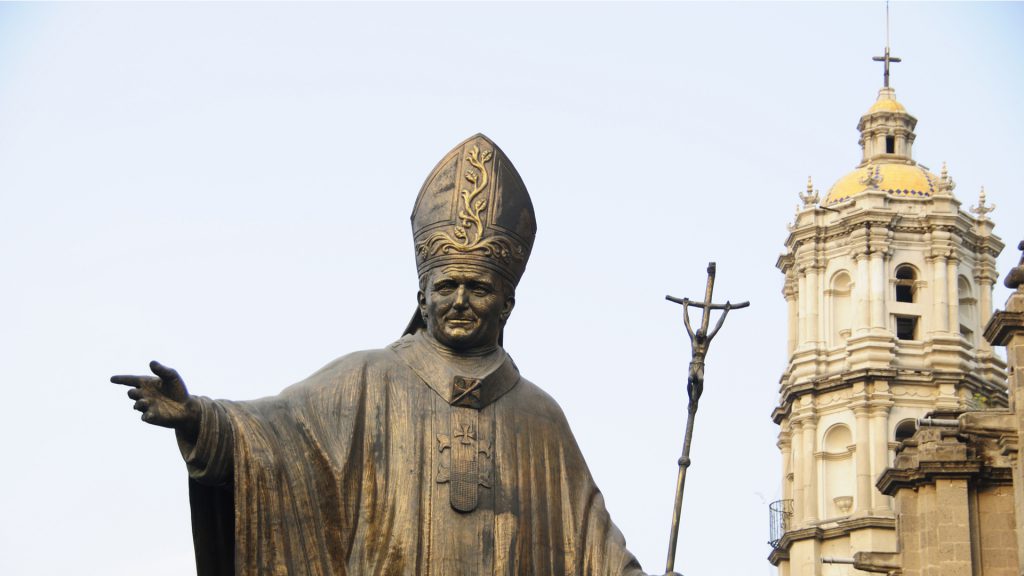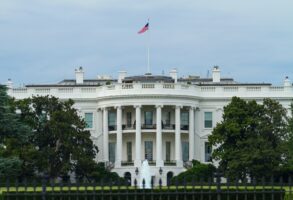
Published May 18, 2020
Religious Freedom Institute blog
Editor’s note: Today marks the centenary of the birth of Pope St. John Paul II. Among his vast contributions as a philosopher, theologian, and leader in the Catholic Church, John Paul II was a vigorous defender of religious freedom throughout his life. To reflect on John Paul II’s thought in this area, the Religious Freedom Institute interviewed George Weigel, author of Witness to Hope: The Biography of Pope John Paul II. Mr. Weigel is Distinguished Senior Fellow of the Ethics and Public Policy Center, where he holds the William E. Simon Chair in Catholic Studies.
In recent years some Catholic “integralists” have argued, among other things, that Dignitatis Humanae allows for a confessional state in which the Church may cooperate with the state in, for example, legal prohibitions against public expressions of non-Catholic religion. You have written extensively of Archbishop Karol Wojtyla’s contributions to Dignitatis and his teaching on religious freedom as Pope. What would he have to say about contemporary Catholic integralists’ views on religious freedom?
George Weigel: He would, I imagine, think that they misconstrue Dignitatis Humanae, which emphasizes both the dignity of the human person (and thus the necessity of the act of faith being freely made for it to be authentic), and the theological incompetence of the state. John Paul II was no nostalgic for the ancien régime (a nostalgia in which many of today’s integralists often indulge, although what they imagine to be the ancien régime never existed in historical fact). John Paul had a very low view of state power, perhaps the lowest of any pope in modern Catholic history. In addition to his defense of human dignity, however, he also understood that religious freedom for all was essential to the New Evangelization and the Church’s efforts to introduce people to Christ and the Gospel. That mission, in his view, would be imperiled by putting coercive state power behind the Church’s proposal. John Paul II admired President Ronald Reagan. Yet he would have regarded as an absurdity the notion that President Reagan declaring Jesus Christ the King of America would advance the Church’s primary mission of offering friendship with the Lord Jesus and incorporation into the communion of his disciples that is the Church.
In your biography of Pope John Paul II you wrote about the dialogue he fostered between Catholicism and Islam, two of “the most assertive, culture forming religious communities in the world.” (Witness to Hope, 859). You observed that whether the Catholic-Islamic dialogue championed by the Pope could “help Islam develop a Qu-ran-based theory of religious freedom,” would have huge implications for the 21st century, particularly in light of the persecution of Christians in Muslim-majority nations. The 21st century has seen no abatement in persecution of Christians. You have written a book on the problem of Islamic extremism, Faith, Reason, and the War Against Jihadism. What, in your view, would Pope John Paul II advise in order to sharpen the focus of the Catholic-Muslim dialogue and push forward the religious freedom agenda?
GW: As he wrote in Crossing the Threshold of Hope, John Paul II deeply admired Muslim piety and the Muslim commitment to regular prayer. Yet he also wrote in that most personal of his books that Christianity and Islam have very different ideas of God, divine revelation, and redemption. Thus I don’t think he would have been much taken with the idea that Judaism, Christianity, and Islam are three expressions of a single monotheistic faith. He knew full well that Islam’s relationship to both Judaism and Christianity is radically supersessionist; that Judaism and Christianity have a relationship with each other that neither has to Islam; and that these fundamental differences involve different understandings of revelation, and of God’s action in history. So he would likely urge the dialogue of the future to focus on ways and means of living together and contending peacefully for the truths in which we believe: an effort that must be religiously warranted for both sides of the conversation. Might Catholicism, which had its own struggles working out a Catholic case for religious freedom, be of some assistance to Islamic authorities trying to do the same from within their own religious tradition? That, I imagine, was his hope for the future of the dialogue, as it was the hope of his successor, Benedict XVI.
In his 1995 address to the United Nations, Pope John Paul II called religious freedom “the cornerstone of the structure of human rights and the foundation of every truly free society.” Here he is enunciating principles like those embraced by the American founders. You have written of the theological and philosophical foundations of Wojtyla’s defense of religious freedom (The Irony of Modern Catholic History, 150-51). How did those foundations differ in your view from those of James Madison and his colleagues?
GW: Well, to begin with, John Paul II was not a Deist, as some of the Founders were. He was a man of the Bible, and he found the deepest roots of religious freedom in the Bible: in God wanting to be adored by people who are free. As a philosopher, he also developed a powerful intellectual argument for religious freedom as that inalienable right that, recognized in law, puts basic limits on state power, and thus makes governance by consent possible. If Caesar is not God, then there is room for democracy. On that crucial point, John Paul’s thinking ran parallel to that of the non-Deist James Madison, who, in his Memorial and Remonstrance, insisted that, as our duties to God are prior to our civic duties, the free exercise of our duties toward God necessitates constitutional and legal constraints on state power, which oversteps its proper limits when it invades that sphere of personal conviction where men and women make (or struggle with, or don’t make) the act of faith.
Address if you would the significance of Pope John Paul’s defense of religious freedom in his first encyclical, Redemptor Hominis in 1979?
GW: Redemptor Hominis was the first papal encyclical to lay out a comprehensive, Christ-centered anthropology of the human person; and in that anthropology, one finds that the inherent dignity of the human person, as a creature capable of knowing and choosing the good, “discloses” religious freedom. The encyclical was read with trepidation behind the iron curtain, for here was a defense of religious freedom grounded, not in the institutional prerogatives of the Church, but in the dignity of the human person, of which Marxism falsely imagined itself the paladin. So John Paul II was saying to the communists, in effect, “I’ll see you and raise you: who has the nobler vision of the human person, human community, human origins, and human destiny?”
How do you think John Paul II would respond to the decline of religious freedom in the West in the last several years? Would he be surprised or do you think he anticipated it? Would his prescription today be different than in 1979, or 1995?
GW: His last major public statement on the political condition of the West, the 2003 apostolic exhortation Ecclesia in Europa, raised hard and important questions about the culturally stifling and politically dangerous effects of a nihilistic secularism in Europe. It is a small step from there to what his successor, Benedict XVI, described as the “dictatorship of relativism,” which we now see at work in many parts of the West: the imposition of a morally relativistic ethic on all of society by coercive state power, in the name of a misconception of freedom as “choice” or willfulness.








